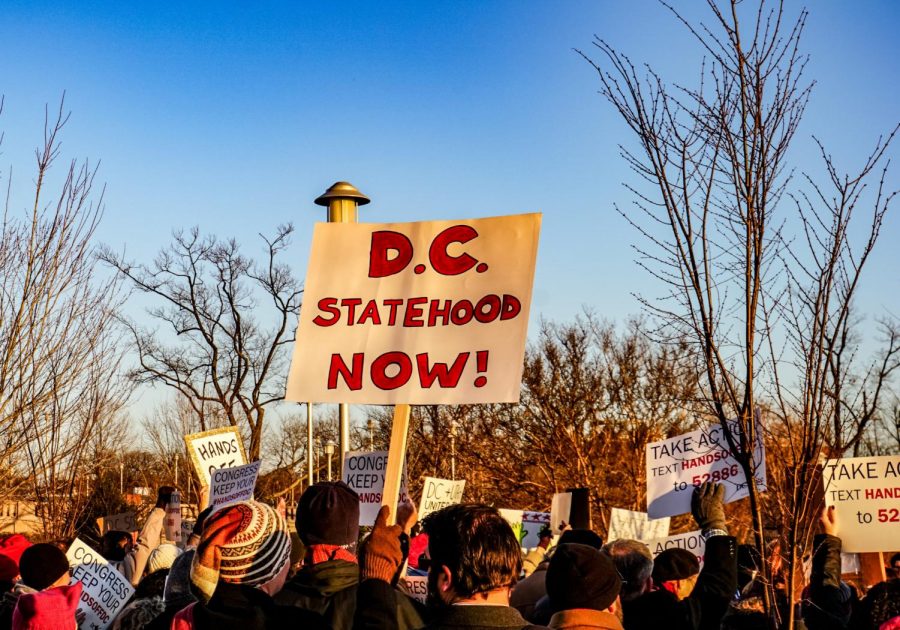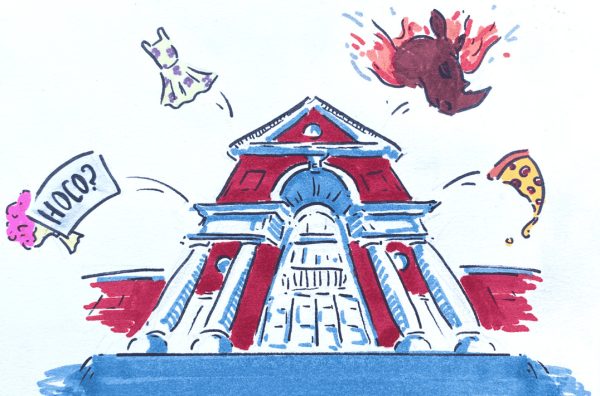The Case for D.C. Statehood
Washingtonians march for DC to become the 51st state.
Adding states to the U.S. is difficult. Despite that, the House of Representatives recently passed legislation that would admit Washington, D.C. as the 51st state. Lawmakers have proposed similar legislation in the past, including a bill that passed the House last year but failed in the Senate. Given that the Senate and the Presidency are both under Democratic control now, the possibility of D.C. statehood is finally within reach. Democratic leadership must seize the moment to recognize the inhabitants of the nation’s capital as equal citizens in our democracy and give them the justice they deserve.
The case for D.C. statehood is simple. Washingtonians pay taxes, die in combat, and are bound by the law, yet they have no say in how their taxes are used, whether the U.S. goes to war, or what federal laws they are governed by, since they elect no voting members of Congress. (D.C. residents can vote for president, it should be noted). Originally, D.C. was established as a neutral territory, so that no one state would hold sway over the federal government. However, over time it has become clear that the location of the capital does not actually grant any special influence, and so statehood initiatives have been periodically proposed. Regardless of the historical context, this lack of representation is clearly an affront to the basic principles of democracy, because any just governmental power must come from the consent of the governed. This concept was expressed by the revolutionary slogan “no taxation without representation,” and if the federal government wants to stand by that ideal, they are obligated to give the citizens of D.C. what is owed to them – the right to self-government.
Given that the argument for D.C. statehood seems very much in line with the country’s ideals, it can be hard to see why some people are so vehemently opposed to the idea. After all, more than 700,000 people live in the district, surpassing the populations of Vermont and Wyoming. However, the opposition starts to make more sense when you look at the political and racial demographics of the city. D.C. votes heavily Democratic, as shown in the 2020 presidential election, when Joe Biden won 92% of the vote. This overwhelming Democratic majority has led many Republican politicians to oppose admitting D.C. to statehood. While they are correct that D.C.’s congressional delegation will likely consist entirely of Democrats, and that Democratic interest and support stems, at least in part, from the political benefits of statehood, they are completely wrong in saying that this is a reason to oppose statehood. If the Republican Party can’t win votes in D.C., they shouldn’t try to rectify that by violating the civil rights of hundreds of thousands of people. To put their political success ahead of Washingtonians’ right to self-governance is despicable, and goes against everything we ought to value as a society.
Another reason people oppose D.C. statehood is, unsurprisingly, racism. D.C., like many other cities in the U.S., is majority minority, with only 37.5% of the population being white non-Hispanics. Given that the suppression of minority voters is one of the main electoral strategies employed by the Republican Party right now, it is unsurprising that they would oppose statehood legislation. Additionally, because the Senate has a strong bias towards white, rural voters, D.C. statehood would threaten rural white voters’ disproportionate control over the Senate. The last time a Republican Senate majority represented a majority of Americans was in 1996, and the Republican leadership knows this. If D.C. were admitted as a state, it would make it significantly harder for conservatives to continue winning electoral victories while sustaining popular losses. Therefore, because D.C. statehood poses a threat to minority rule – which has allowed white voters to have disproportionate control over the country’s affairs for decades – Republican politicians uniformly oppose any progress on the issue.
Moderates in both parties have attempted to find a compromise that satisfies advocates for and opponents of statehood. Some, including Republican Senators Mitt Romney of Utah and Susan Collins of Maine, have proposed a plan which would merge Washington, D.C. with Maryland, in an attempt to grant representation in Congress to Washingtonians while maintaining Republican minority rule in the Senate. Setting aside the fact that minority rule is by nature unjust, this plan has one key problem: nobody in D.C. wants to merge with Maryland, and nobody in Maryland wants to absorb D.C.. In addition, D.C. residents have voted overwhelmingly in favor of statehood in referendums as recent as 2016, meaning that anything other than statehood would be directly disregarding their expressed wishes.
Others, such as Democratic Senator Joe Manchin of West Virginia, have sought routes to statehood that contradict the Constitution. Manchin proposed drafting a constitutional amendment that would make D.C. a state, arguing that Congress doesn’t have the power to add a new state without such an amendment. This argument is patently false, as Article IV, Section 3, Clause 1 of the Constitution gives Congress the power to admit new states. However, the argument doesn’t need to be true to serve as the distraction it is, in fact, intended to be. A constitutional amendment like the one Manchin is proposing would be a political impossibility, and he knows it. Instead of coming out against statehood in its entirety, however, he’s trying to kill the bill by proposing an alternative that isn’t actually viable. That way, he hopes not to lose face with either liberal or conservative voters. It’s a solution that isn’t meant to solve anything but Manchin’s political troubles, and should be opposed.
Lastly, no discussion about statehood would be complete without mention of Puerto Rico. The case for statehood for Puerto Rico is significantly more complex than that of Washington, D.C., and although Puerto Rico ought to have the right to self-determination, it is not clear where the majority of Puerto Ricans stand. Whereas voters in D.C. overwhelmingly supported statehood in the last referendum, voters in Puerto Rico are split on the subject, with statehood winning a very narrow victory in the referendum in 2020. Only half of eligible Puerto Ricans participated in that referendum, however, and similar referendums in the past have been plagued by boycotts. Therefore, it is difficult to know exactly where Puerto Ricans stand on the issue at the moment. There are solutions to the problem that currently have Democratic support in Congress, and these are the types of solutions that must be pursued. If the U.S. were to dictate statehood to Puerto Rico, it would merely be a continuation of the imperialistic policies implemented by the government in the past century of U.S. rule.
The case of D.C. is significantly more straightforward, given that the people of D.C. deserve the same representation in government that all U.S. citizens have. Therefore, D.C. statehood is the only option that should be pursued. Anything else would be unjust, undemocratic, and would go against everything we claim to value as a country. The people of D.C. have been disenfranchised for too long, and it is high time they were given what they are due: full and equal representation in our government.






